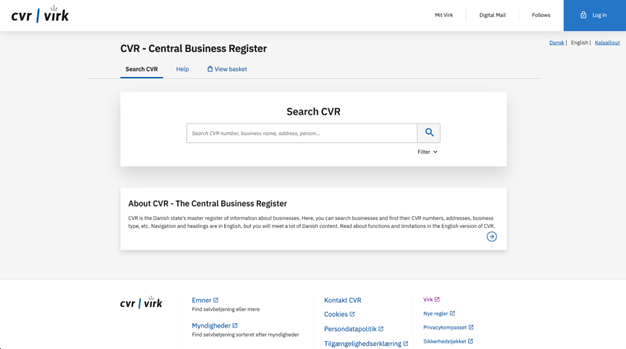Use and impact of public beneficial ownership registers: Denmark
Summary
The adoption of the European Union’s (EU) fourth and fifth Anti-Money Laundering Directives (AMLD) in 2015 and 2018 led to many of the world’s first public beneficial ownership (BO) registers being implemented on the European continent. Since its creation in 2017, Denmark’s public BO register has allowed a variety of actors – from journalists to government and businesses – to make use of the available data for a range of purposes. However, the judgement of the Court of Justice of the European Union (CJEU) in November 2022 ruled that the provision in the fifth AMLD, requiring public access to beneficial ownership information (BOI), was legally invalid, and it has pushed governments, businesses, and civil society to think about how to better strike the balance between privacy, data protection, and transparency.[1] To achieve this balance, governments should consider the specific policy goals of countries implementing beneficial ownership transparency (BOT); which users of BOI can contribute to achieving these goals; and what their specific needs are, in order to enable them to use BOI to achieve these goals. Lessons and experiences from countries that implemented some of the first registers, including the use of BOI by non-government actors and, in particular, the value of public access, can offer valuable perspectives for policy makers.
Denmark was one of the first countries to implement a public BO register, facilitating the use of BO data by a range of actors. Since the Danish register was launched in 2017, BOI has been extensively used by business and investigative journalists, the financial and real estate sectors, corporate data service providers, and government agencies. This has been enabled by the comprehensive reforms that Denmark has passed to ensure the information is useful, usable, and used. Measures have been taken to increase levels of compliance; establish digital approaches to ensure the accuracy of information; and ensure information is accessible and available in a number of ways, including through an application programming interface (API).[2] Each of these measures enable BO data use.
Corporate data service providers play a central role in Denmark’s information ecosystem. Many of them use the API provided by the Danish Business Authority (DBA) to ingest BOI into various software products, platforms, and tools, and combine it with other data sources to maximise its usability and provide new analytical insights. A broad range of BO data users, including government agencies, rely on these services and tools. For example, the tax authority relies on a tailored product to raise red flags for fraud and tax evasion. Investigative journalists use BOI from the Danish register to expose financial crimes and help businesses make investment decisions. Widespread use of BOI can further complement the government’s efforts to ensure data accuracy.
Denmark shows how effective BOT reforms can help government, private sector, and civil society actors advance domestic policy objectives. However, a key challenge raised by data users is the lack of access to structured BOI from other jurisdictions. Due to the transnational nature of financial crime, effective implementation in more jurisdictions, and the ability to combine information from different national BO registers and other datasets, is a key demand from Danish data users.

| Established | 2017 |
|---|---|
| Corporate vehicles covered |
- Main types of legal entities, including companies, partnerships, and foundations - Certain types of associations, funds, and trade unions - Trusts and similar legal arrangements[4] Publicly listed companies, sole proprietorships, and personally owned small enterprises, independent public enterprises, subsidiaries, and specific associations are not covered. |
| Number of beneficial owners registered | 418,000[5] |
| Number of companies registered | 2,083,037[6] |
| Data on the Open Ownership Register [7] | Yes |
Endnotes
[1] For more information, see: Tymon Kiepe, “Striking a balance: Towards a more nuanced conversation about access(es) to beneficial ownership information”, Open Ownership, 18 October 2023, https://www.openownership.org/en/blog/striking-a-balance-towards-a-more-nuanced-conversation-about-access-to-beneficial-ownership-information/.
[2] “An API is an interface that allows two software applications to talk to each other. Any programmatic analysis or machine-to-machine usage of BO data is likely to rely on web APIs, a way of making structured requests for information over the internet.” Jack Lord and Tymon Kiepe, Structured and interoperable beneficial ownership data (s.l.: Open Ownership, 2022), https://www.openownership.org/en/publications/structured-and-interoperable-beneficial-ownership-data.
[3] As explained on the CVR website, Virk is the digital portal for Danish businesses to access public sector services. See: “Om Virk”, Virk, n.d., https://virk.dk/vejledning/virk-om-virk/.
[4] Trusts and legal arrangements established under the laws of other countries that have a link to Denmark are covered by the requirements. This includes cases when the trustee of the trust or person holding a similar position in a similar legal arrangement is a resident of Denmark, or when a resident abroad enters into a business relationship or acquires real estate in Denmark in the name of the trust or similar legal arrangement. See: LBK nr 1062 of 19/05/2021, Chapter 10a, Retsinformation, n.d., https://www.retsinformation.dk/eli/lta/2021/1062. Common law trusts are not legally recognised in Danish law, and Denmark has not ratified the Hague Trust Convention of 1985. It is possible under Danish law to create an arrangement where one person has a legal title of property that is held and managed for the benefit of another, but no rules govern this. See: Tove H. Dahl and Alexandra Castenschiold Paaske, Denmark: International Estate Planning Guide – Individual Tax and Private Client Committee, (Copenhagen: Cordes & Castenschiold, 2021), https://www.ibanet.org/MediaHandler?id=8A3141F7-10DD-4CA4-9F4E-7B60662E0298.
[5] Active and terminated beneficial owners on 1 December 2023: “Søg i CVR”, CVR - Det Centrale Virksomhedsregister, n.d., https://datacvr.virk.dk.
[6] This number includes dissolved companies, sole proprietorships, and other corporate vehicles exempt from disclosing their beneficial owners, as analysed on 1 December 2023: “Søg i CVR”, CVR - Det Centrale Virksomhedsregister, n.d., https://datacvr.virk.dk.
[7] “Open Ownership Register”, Open Ownership, n.d., https://register.openownership.org/.